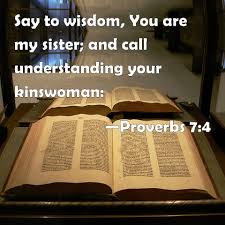
Shownotes
Wisdom-Trek / Creating a Legacy
Welcome to Day 1061 of our Wisdom-Trek, and thank you for joining me.
I am Guthrie Chamberlain, Your Guide to Wisdom
God’s Right-Hand Woman – Wisdom Wednesday

Wisdom – the final frontier to true knowledge. Welcome to Wisdom-Trek where our mission is to create a legacy of wisdom, to seek out discernment and insights, and to boldly grow where few have chosen to grow before.
Hello, my friend, I am Guthrie Chamberlain, your captain on our journey to increase wisdom and create a living legacy. Thank you for joining us today as we explore wisdom on our 2nd millennium of podcasts. This is Day 1061 of our trek, and it is Wisdom Wednesday.
Creating a Biblical worldview is important to have a proper perspective on today’s current events. To establish a Biblical worldview, you must also have a proper understanding of God’s Word. Especially in our western cultures, we do not fully understand the Scriptures from the mindset and culture of the authors. In order to help us all have a better understanding of some of the more obscure passages in God’s Word, we are investing Wisdom Wednesday reviewing a series of essays from one of today’s most prominent Hebrew Scholars Dr. Micheal S. Heiser. He has compiled these essays into a book titled I Dare You Not to Bore Me with the Bible.
While much of the Bible is written from a patriarchal perspective, women certainly play an integral part of God’s redemption story. I don’t think it is by coincidence that when Scripture speaks of wisdom that it is referred to in the feminine gender. In today’s essay, we will explore passages that cover…
God’s Right-Hand Woman
 Hebrews 1:2 tells us, “And now in these final days, he has spoken to us through his Son. God promised everything to the Son as an inheritance, and through the Son he created the universe.” This is also emphasized in Colossians 1:16 and in I Corinthians 8:6. Jesus’s role as co-creator with God is a familiar doctrine. But in Hebrews 1:3 there’s something that’s a bit odd, “The Son radiates God’s own glory and expresses the very character of God, and he sustains everything by the mighty power of his command. When he had cleansed us from our sins, he sat down in the place of honor at the right hand of the majestic God in heaven.”
Hebrews 1:2 tells us, “And now in these final days, he has spoken to us through his Son. God promised everything to the Son as an inheritance, and through the Son he created the universe.” This is also emphasized in Colossians 1:16 and in I Corinthians 8:6. Jesus’s role as co-creator with God is a familiar doctrine. But in Hebrews 1:3 there’s something that’s a bit odd, “The Son radiates God’s own glory and expresses the very character of God, and he sustains everything by the mighty power of his command. When he had cleansed us from our sins, he sat down in the place of honor at the right hand of the majestic God in heaven.”
What’s strange about the phrase isn’t its meaning. We get the metaphor. Jesus “radiates” the glory of God; He is a brilliant reflection of what God is like. What’s odd is where the idea comes from, and how startling it would have been to the Jewish Christians for whom the book of Hebrews was intended.

The word “radiates” (apaugasma) occurs only here in the New Testament. To figure out what the writer of Hebrews meant, we have to look at his source. The writer is quoting the Septuagint, the Greek translation of the Old Testament, but the Septuagint included books that many Jews and Christians today do not consider part of the biblical canon, but which some in ancient times considered sacred. The phrase in Hebrews 1:2 comes from one of these books titled Wisdom of Solomon.
Which is different than the book of Proverbs in our Old Testament. How can we be sure? Because the word (apaugasma) is found only one time in the Septuagint: Wisdom of Solomon [7:26]. Sure, the scarcity of the word is curious, but where’s the surprise? Not only is the word extremely uncommon, but the source of the Hebrews 1:2 quotation has a woman as God’s personified reflection. As Dr. Heiser puts it, “welcome to the biblical twilight zone.”
The Wisdom of Solomon [7:24]-26 from the Septuagint from which this word is taken reads as follows:
For wisdom is more mobile than any motion; because of her pureness she pervades and penetrates all things.
For she is a breath of the power of God, and a pure emanation of the glory of the Almighty; therefore nothing defiled gains entrance into her.
For she is a reflection (apaugasma) of eternal light, a spotless mirror of the working of God, and an image of his goodness.
The Jewish writer of the Wisdom of Solomon got the idea of personified Wisdom as a woman from the book of Proverbs. While the term most often refers to practical, insightful living according to God s law, the writer of Proverbs at times portrays Wisdom as a woman as a feminine personal pronoun “she.” (Read Proverbs 1:20-33; 3:13-16; 4:6: 7:4; 9:1-6). Proverbs 8:1 describes Wisdom speaking to God’s people, “Listen as Wisdom calls out! Hear as understanding raises her voice!”
But what is especially remarkable about Wisdom in Proverbs 8:22-30 is that she is described as God’s co-creator. The wording here echoes Proverbs 3:19, where we read, “By wisdom, the Lord founded the earth; by understanding, he created the heavens.”
This is also similar to Jeremiah [10:12]. Wisdom, personified as a woman, is cast as God’s agent of creation in the Old Testament.
How is this consistent with the New Testament teaching about Jesus? We need a little more backdrop to answer that question.
About 250 years before Jesus, Jewish theologians equated the Torah with wisdom mainly because torah was also a grammatically feminine word in Hebrew and the Torah made one wise. This meant that, to many Jews, the Torah (Wisdom) was divine. Again taken from the Septuagint:
Sirach 24:1-3, 22 – “Wisdom praises herself, and tells of her glory’ in the midst of her people. In the assembly of the Most High she opens her mouth, and in the presence of his hosts she tells of her glory: I came forth from the mouth of the Most High, and covered the earth like a mist’…All this is the book of the covenant of the Most High God, the law that Moses commanded us.”
Wisdom of Solomon 9:1, 4, 10, 18 –“God of my ancestors and Lord of mercy…give me the wisdom that sits by your throne…Send her forth from the holy heavens, and from the throne of your glory’ send her…that I may learn what is pleasing to you…and people were taught what pleases you, and were saved by wisdom.
For these writers, the word spoken by God at the creation in Genesis 1:3 was Wisdom—the word of the Torah. Proverbs [8:22] cast this spoken Wisdom as a living divine entity, whose instruction would later be written down by Moses. Wisdom (Torah) was God’s agent of creation and even the Savior for Jewish theology.

The New Testament writers had another view. Paul’s description of Jesus as “the Wisdom of God” (l Corinthians [1:24], 30) and God’s agent of creation was a theological jolt to Jewish ears. It places Paul’s struggle to articulate the gospel “apart from the law (Torah)” in an entirely new light (Romans [3:21]). Defining Wisdom as Jesus was another way for Paul to say that Jesus was indeed the Word of creation, the agent at God’s right hand, as John had as well (John 1:1-4). That also meant that Jesus was Wisdom (Torah), the means of salvation. In fact, Jesus asserts that He is the fulfillment of Wisdom (Torah) (Matthew [5:17]-20). It was Jesus who radiated God’s character to humankind as the bearer of salvation. Along with Paul and John, the author of Hebrews articulated this startling view by calling Jesus “The Son radiates God’s own glory.”
QUICK BIT: Proverbs 8 and the identification of Jesus with Wisdom was a controversial issue for the early church. In the debates at the Council of Nicea, those who believed Jesus to be God’s first creation sought affirmation in Proverbs 8:22, where the Lord brought forth Wisdom. The phrase “formed me from the beginning” is a Hebrew verb (qanah) that can be used for creation as we see in Psalms 139:13, “You made all the delicate, inner parts of my body and knit me together in my mother’s womb” and Genesis [14:19], 22 (“creator of heaven and earth”). Some translations have possessor instead of creator which is a possible translation. The interpretation of this verb was a factor in the distinction between the “begotten, not made” language of the Nicene Creed.
Since Wisdom is a personification of an attribute of God, the key questions are “Was there ever a time when God did not have Wisdom? If so, how then can God be God?” It would be unthinkable to the biblical writer for the God of Israel to lack wisdom at some point. Wisdom is eternal since God (with His attributes) is eternal—“brought forth” as the agent of creation.
That will conclude our essay for this week. Next Wisdom Wednesday we will continue in the New Testament as we look at Dr. Heiser’s next essay titled “Baptism as Spiritual Warfare.” I believe you will find this another interesting topic to consider as we build our Biblical worldview.
Tomorrow we will continue with our 3-minute humor nugget that will provide you with a bit of cheer and help you to lighten up and live a rich and satisfying life. So encourage your friends and family to join us and then come along with us tomorrow for another day of our Wisdom-Trek, Creating a Legacy.

If you would like to listen to any of our past 1060 treks or read the Wisdom Journal, they are available at Wisdom-Trek.com. I encourage you to subscribe to Wisdom-Trek on your favorite podcast player so that each day’s trek will be downloaded automatically.
Thank you so much for allowing me to be your guide, mentor, and most of all your friend as I serve you through the Wisdom-Trek podcast and journal.
As we take this trek together, let us always:
- Live Abundantly (Fully)
- Love Unconditionally
- Listen Intentionally
- Learn Continuously
- Lend to others Generously
- Lead with Integrity
- Leave a Living Legacy Each Day
I am Guthrie Chamberlain reminding you to Keep Moving Forward, Enjoy Your Journey, and Create a Great Day Everyday! See you tomorrow!